⚠️ Did you receive a message in Facebook Messenger from a user named like “Guest 5046” or “Guest 2058” claiming your Facebook page will be deleted? This is a scam aiming to steal your login information. Its objective is to deceive you into surrendering your credentials.
Here’s the scenario: The scam message, allegedly from a “Support agent at Facebook” with a support ID, states that your page will be permanently deleted due to a post infringing trademark rights. It includes a link, such as “metagroup-8228413251.pages.net.br”, which might appear legitimate. However, this link directs to a fraudulent website designed to harvest your Facebook login details. You must avoid clicking on these links or submitting any information.
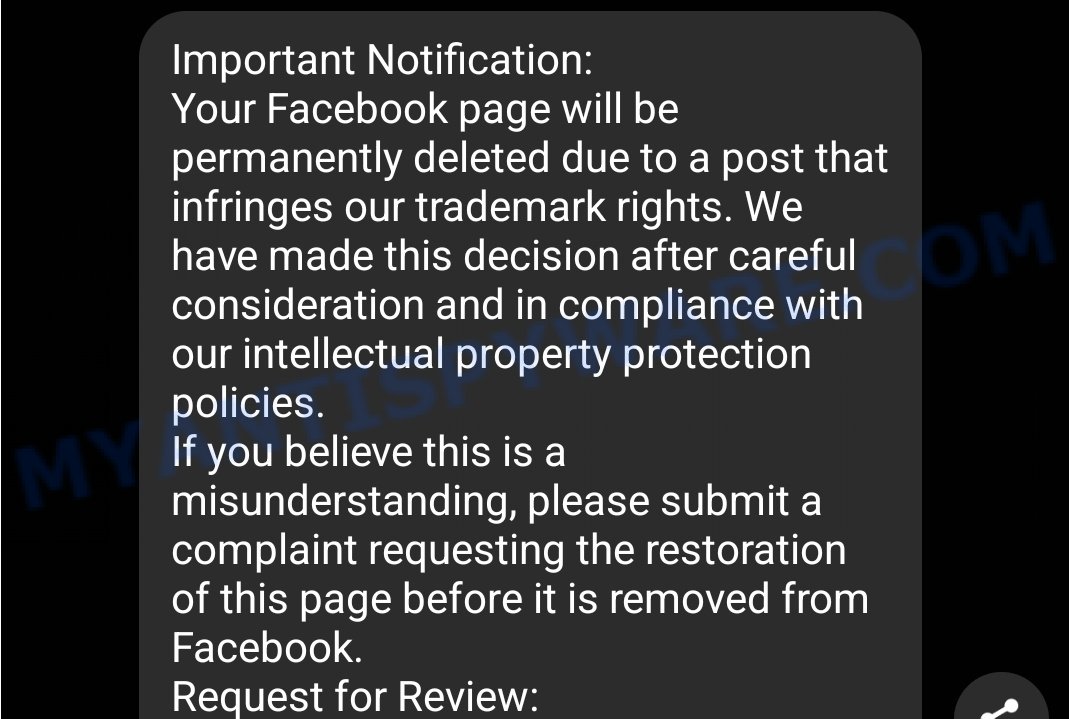
The Facebook Messenger Scam Message From Guest, with its alarming claim that “Your Facebook page will be permanently deleted”, is a deceptive tactic. Despite its convincing appearance, it is a phishing scheme designed to trick you. ❗ It’s important to remember that legitimate companies, especially prominent ones like Meta (the parent company of Facebook), won’t seek personal information or account verification via unsolicited messages or emails. Stay informed on how to spot these scams to protect your account effectively.
Table of Contents
🚨 Is the Facebook Messenger Message From Guest a Scam?
Yes, the “Your Facebook page will be permanently deleted” message from a Facebook user named “Guest 5046” (“Guest 2058”, …) is a Scam! 🚫. If you’ve received a message seemingly from a “Facebook support agent ” with a support ID, be extremely cautious. These messages are not from the official ‘Meta Platforms, Inc.’ and are crafted to create panic and urgency.
The scam message typically reads:
Your Facebook page will be permanently deleted due to a post that infringes our trademark rights. We have made this decision after careful consideration and in compliance with our intellectual property protection policies.
If you believe this is a misunderstanding, please submit a complaint requesting the restoration of this page before it is removed from Facebook.
Request for Review: https://checkpoint-2515584.pages.net.br/1
We understand that this may impact your current business objectives. If we do not receive a complaint from you, this will be our final decision. Thank You,
This is a message from a temporary support agent with support id 231778895, please visit the link above and follow the instructions.
Noreply Facebook. Meta Platforms, Inc., Attention: Community Support, 1 Facebook Way, Menlo Park, CA 94025
The fraudulent links (like “https://checkpoint-2515584.pages.net.br/1”) in these messages lead users to fake websites designed to mirror the actual Meta platform. 🚨 The goal? To trick you into divulging sensitive information, including your login details, personal data, and sometimes even photos of your ID. Remember: legitimate platforms like Meta seldom send unsolicited messages demanding immediate action or personal information. Stay vigilant and always verify through official channels before taking any action. 🛡️
🚩 Red Flags to Watch Out For:
Exercise caution and verify the message’s authenticity through official means if you encounter these warning signs. 🔍🛡️
- 📧 Unofficial Sender Name: A name like “Guest 5046” or “Guest 2058” does not align with Meta’s official communication style. Meta uses recognizable and direct sender names in its official messages.
- 🔗 Suspicious Links: The message includes unusual links, not authentic Meta or Facebook domains. Always scrutinize the link’s destination before clicking.
- ⏳ Urgency Tactics: Legitimate platforms rarely use scare tactics. The message applies pressure with terms like “permanently deleted” and “urgent response required”, aiming to prompt hasty decisions.
- 🆔 Requests for Personal Information: Be wary of unexpected messages asking for extensive personal data, especially requests to upload IDs. This is not a usual process for account verification.
- ✍️ Grammar and Language: Phishing messages may contain noticeable grammatical mistakes or strange phrasing. Odd language or formatting is a potential warning sign.
- 🚫 Lack of Personalization: The scam message is typically generic and doesn’t address you by name or reference your specific Facebook page. Authentic notifications usually include personalized details.
- 🔄 Excessive Verification Steps: The scam involves multiple steps aimed at collecting as much information as possible. While verification is common, complex procedures initiated via unsolicited messages are a red flag.
🕵️♂️ How the Scam Works
The Facebook Messenger Scam Message From Guest is a sophisticated deception, exploiting users’ trust and urgency to address what appears to be a critical issue. Understanding the mechanics of this scam is key to protecting yourself from falling prey to it. 💡🔐
🚨 Initial Panic
When page owners receive a message from a user named like “Guest 5046” or “Guest 2058”, warning that their Facebook page will be permanently deleted due to a trademark rights infringement, immediate stress and alarm are natural reactions. The fear of losing their online presence and customer interactions is exactly what the scammers bank on. The message’s credible-sounding tone, coupled with the severe warning of “permanent deletion of your page”, is engineered to provoke panic. This urgency pushes users to hurriedly click on the provided links without scrutinizing their legitimacy.
🔗 Phony Links
These scam messages ingeniously include links, such as “https://checkpoint-2515584.pages.net.br/1”, which might seem official at a cursory look but are entirely fraudulent. These domains are not connected to the authentic Meta or Facebook platforms. The primary aim? To lead unsuspecting users to counterfeit websites that mimic the actual Meta interface, ensnaring them in the scam. It’s vital to remember: genuine communications from Meta use familiar domains like “facebook.com” or “meta.com”, and they would not direct you to external sites for issue resolution.
VirusTotal flagged “checkpoint-2515584.pages.net.br” as phishing and malware:
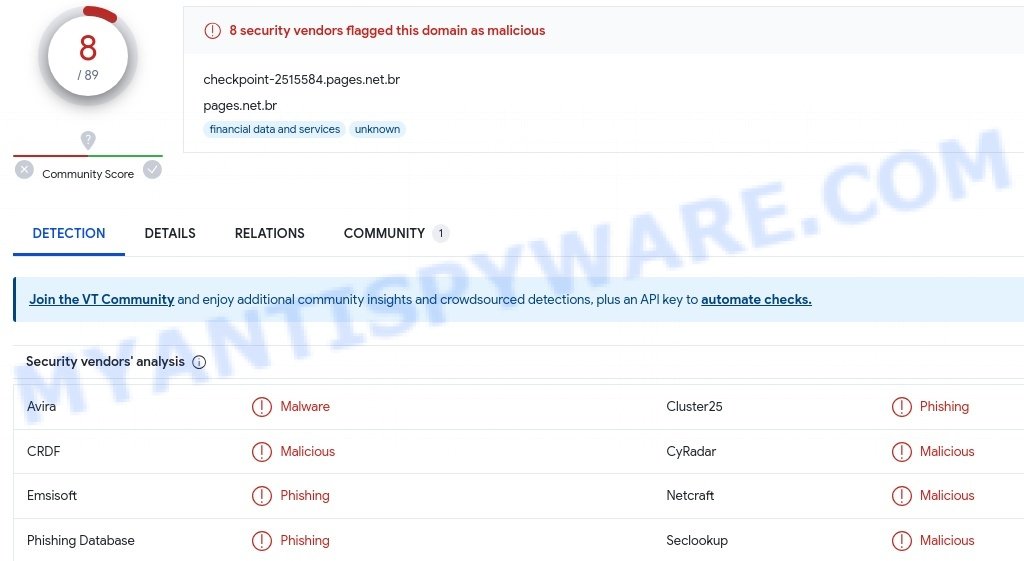
🎭 Mimicry
Once users click on the deceptive links, they’re led to sites that are startling replicas of the Meta Business interface. Every detail, from logos to fonts and even the page layout, is crafted to mirror the official platform. This mimicry serves a singular purpose: to convince users they’re on a genuine Meta page. In reality, every piece of information entered here—logins, personal data, or ID photos—goes directly into the hands of scammers.
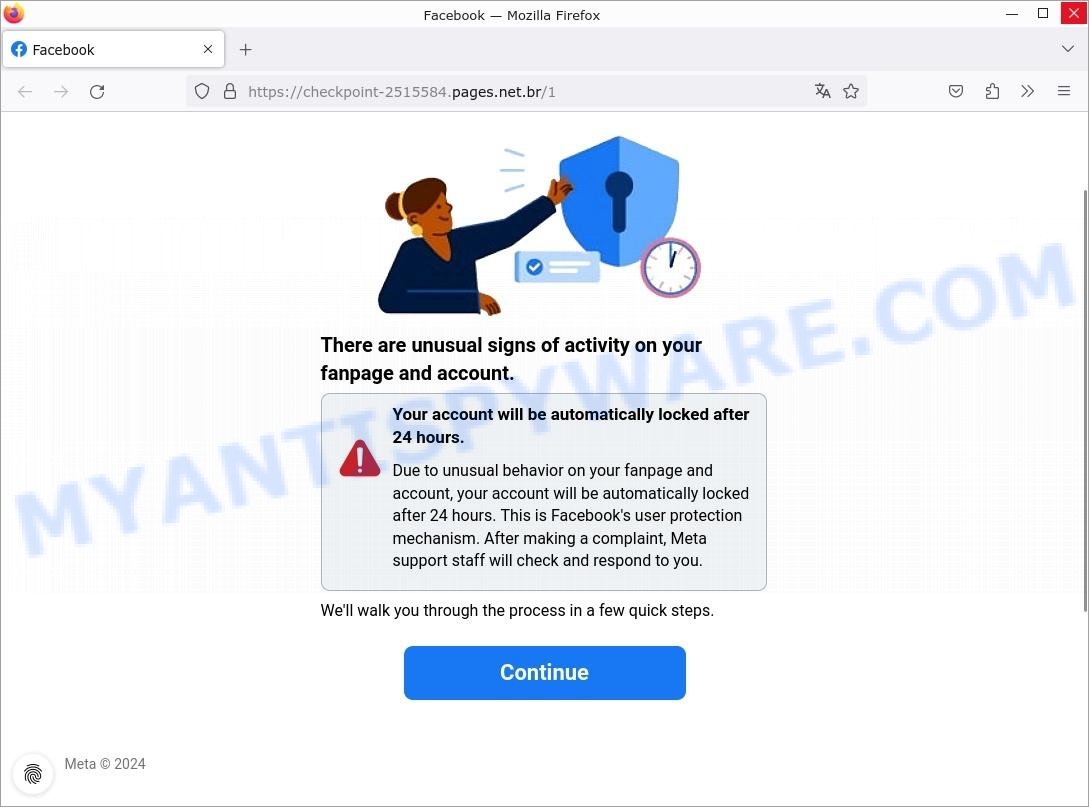
📥 Data Harvesting
When a user clicks on the “Continue” button, they’re prompted to enter their login credentials. This is the scammer’s primary goal: capturing your username and password.
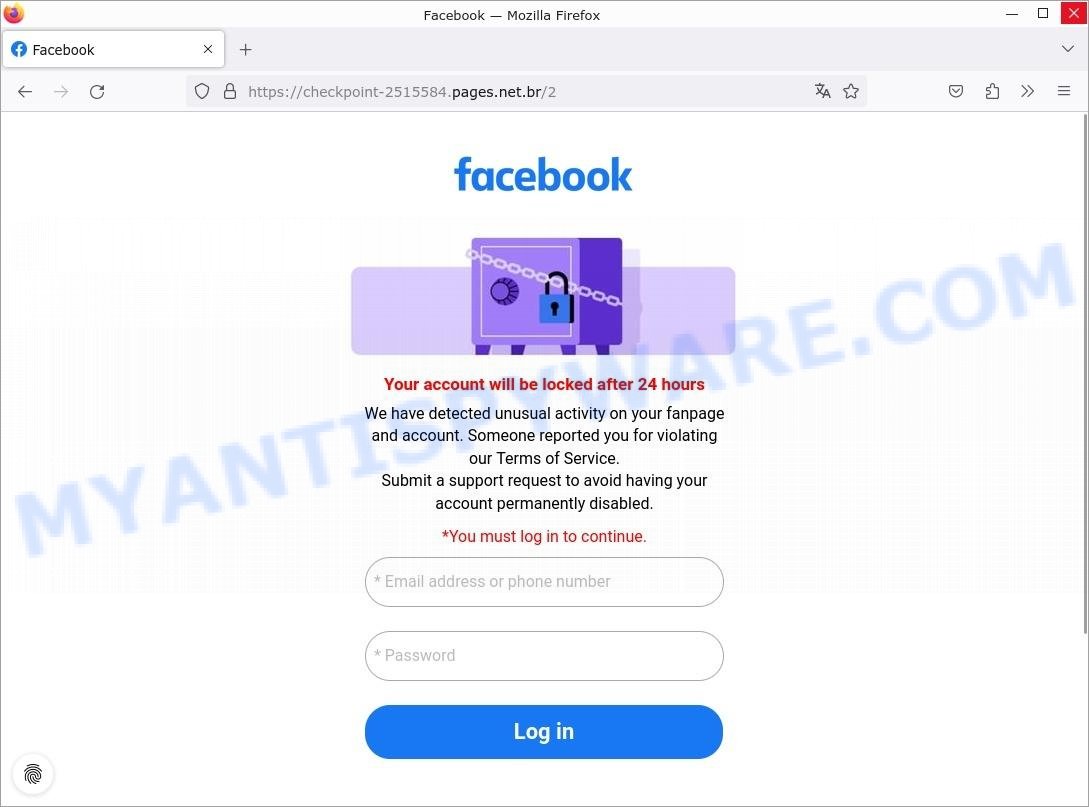
📋 More Personal Data
After obtaining login details, the scam doesn’t stop. Users are then led through a series of steps, from entering a phone to providing an email address for ‘feedback messages’, further amassing data for potential misuse.
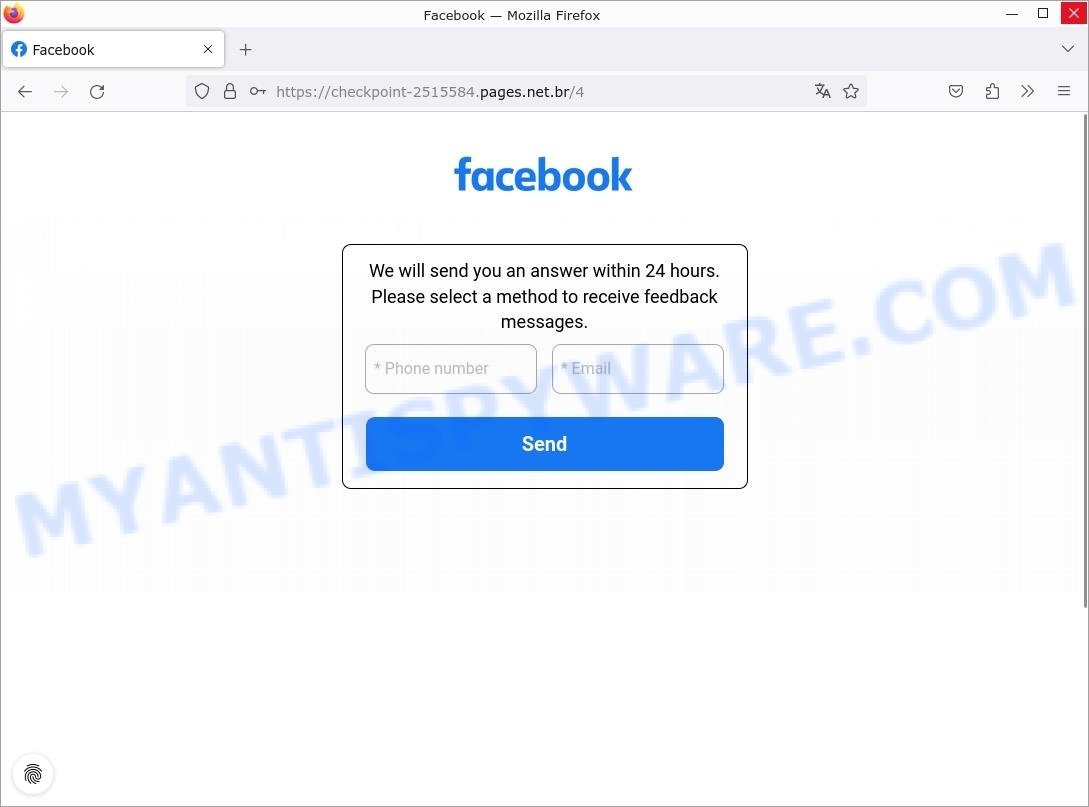
🔄 False Reassurance
After extracting the victim’s data, the fake site then offers a comforting illusion of resolution. Users are shown a “Logged in successfully. You have confirmed that this is your account” status. This tactic gives victims the false belief that they’ve averted a crisis and that their accounts are safe, when in reality, the scammers have now obtained everything they were after.
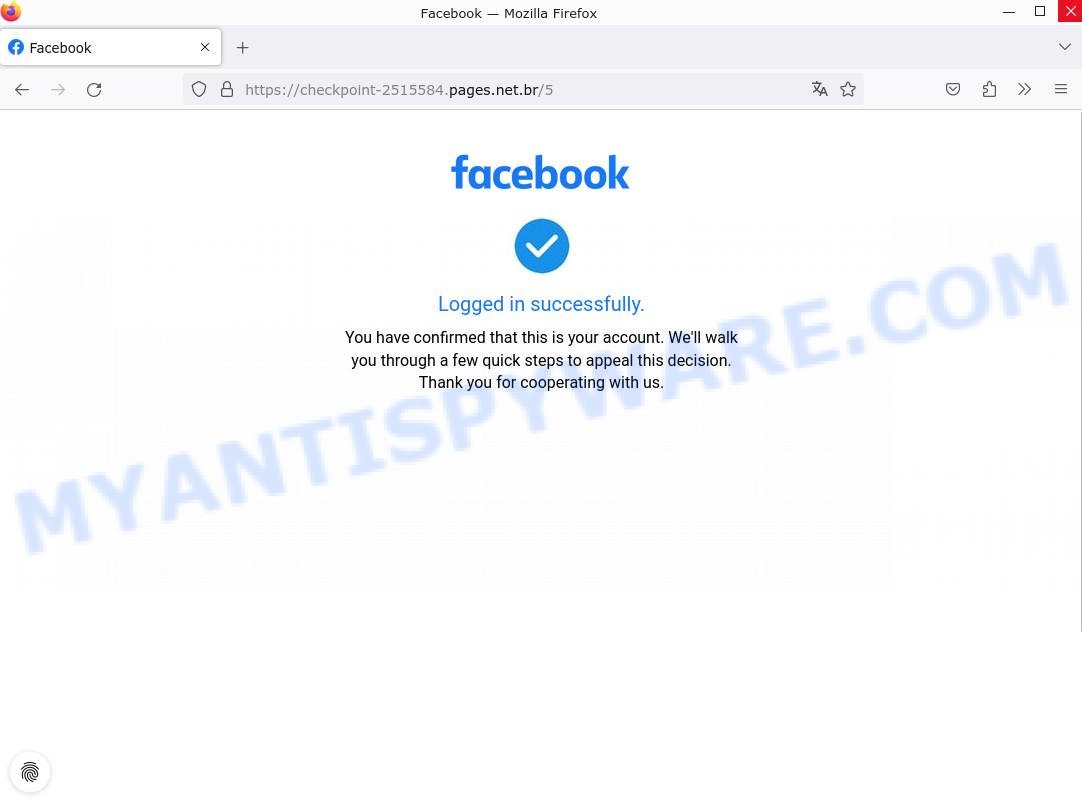
What to Do If You Receive the Facebook Messenger Scam Message From Guest
If you’ve been targeted by the Facebook Messenger Scam Message From Guest, you’re not alone. The scam, designed to exploit unsuspecting users by posing as an authentic warning from the platform, can be unsettling. However, taking informed and prompt action can safeguard your account and personal information. Here’s a step-by-step guide on how to handle the situation effectively.
🚫🔗 Don’t Click Any Links
If you receive a suspicious message, avoid clicking any embedded links. This is the primary way scammers can lead you to fraudulent websites.
🔐 Change Your Password
Immediately update your Meta Business and other related account passwords to ensure security, especially if you suspect you’ve been compromised.
📞 Verify Through Official Channels
Before taking any action, reach out to Meta’s official support channels or check their official website for any known issues or alerts.
🚨 Report the Scam
Forward the message or provide details of the scam to Meta’s official reporting channels, phish@fb.com. This helps them be aware and possibly take action.
👥 Educate Your Team
If you run a business, make sure your team knows about the scam so they can also be on the lookout and avoid falling prey.
🔒 Two-Factor Authentication
Enable two-factor authentication for an added layer of security on your accounts, making it harder for unauthorized users to gain access.
📰 Stay Updated
Regularly check for news or updates on common scams and phishing tactics to always be one step ahead of cybercriminals.
Examples of such scams
Scams using emotional manipulation and fake news are unfortunately common tactics used by cybercriminals to exploit people’s vulnerabilities and steal money or personal information. The Facebook Messenger Scam Message From Guest is just one example of such schemes. These scams often rely on shock value or sensational claims to get people to click on a link or provide sensitive information. Below are some other examples of similar scams to watch out for.
🚫 ‘We Added a Restriction to Your Account’ Scam
This scam alarms users with a notification stating that a restriction has been added to their account due to a breach of community standards. They’re urged to click on a link to lift the restriction.
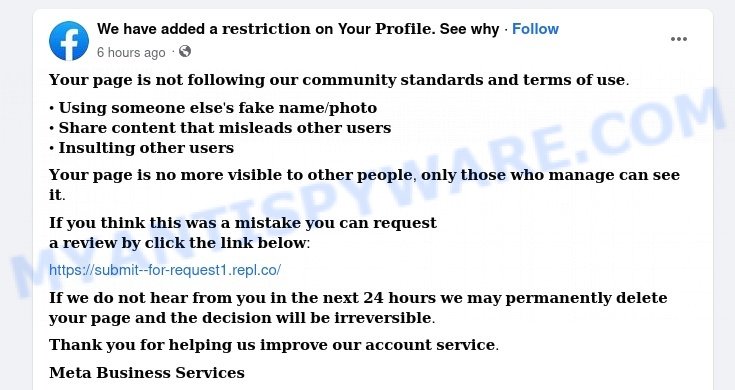
📧 Facebook Account Recovery Code Email Scam
Victims get an email claiming to be from Facebook Support, stating that they’ve requested a password reset. The email contains a “recovery code” and prompts users to confirm their identity by clicking on a provided link.
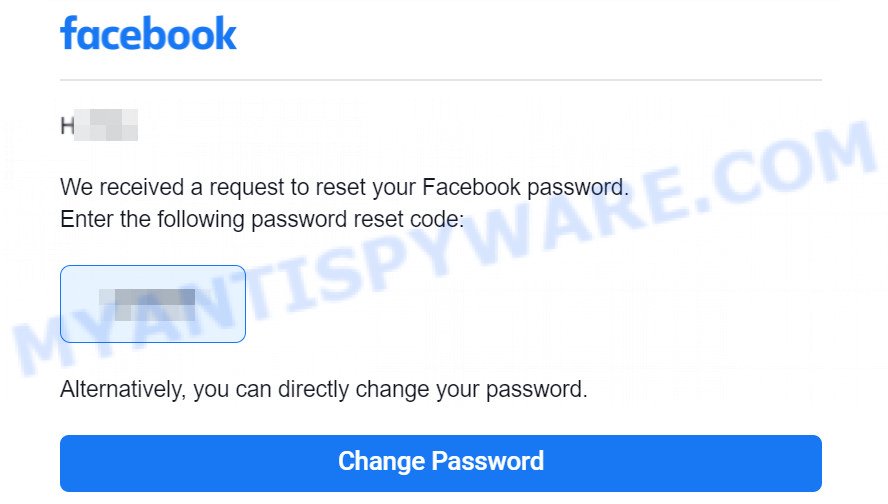
📊 Meta Business Support Scam
Users are targeted with messages that appear to be from “Meta Business Support”, claiming that a user’s page has been disabled due to intellectual property violations. The scammers then prompt users to click on a link to “resolve” the purported violation.
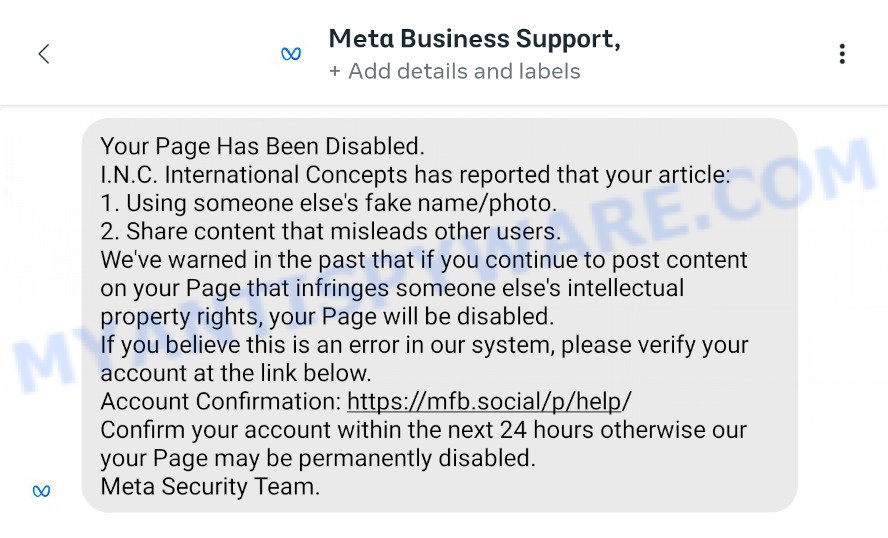
How to Report a Scam on Facebook Messenger?
Encountering the Facebook Messenger Scam Message From Guest can be alarming, but it’s vital to take action. Not only does reporting the scam protect your account, but it also aids Facebook in safeguarding the entire community from such threats. If you’ve stumbled upon this deceptive message, here’s a comprehensive guide to ensure you respond effectively and notify the platform promptly.
- Open the conversation with the sender of the message or the conversation where the message was sent.
- Click on the name of the sender of the message to open their profile.
- Click on the “Report” link or button located below the sender’s name.
- Choose the option that best describes the scam message, such as “Scam or fraud” or “Spam”.
- Follow the prompts to provide more information and complete the report.
By reporting suspicious activities, users play a pivotal role in enhancing the platform’s safety, making it less conducive for scammers to operate.
Summary Table
| Name | Facebook Messenger Scam Message From Guest, Fake Facebook Page Deletion Warning |
| Type | Phishing Scam |
| Damage | Potential loss of personal and login data, risk of Facebook account hijacking, possible financial loss |
| Distribution | Facebook Messenger |
| Tactics | Impersonation of Facebook support, inducing fear and urgency, use of fake links, false claims of trademark infringement |
| Scammers’ Websites | Links like “https://metagroup-8228413251.pages.net.br/”, “https://checkpoint-2515584.pages.net.br/1”, “https://push.fm/fl/businesss-care-755445810”, and other similar fraudulent pages |
| Prevention Tips | Always verify message authenticity, refrain from clicking on suspicious links, enable two-factor authentication, update passwords regularly, be wary of urgent and unsolicited requests for action or personal information. |
| Reporting Info | Report suspicious messages to Facebook via their official reporting tools, consider informing local cybersecurity or law enforcement authorities |
😱 Steps to Take If You’ve Been Tricked by the Facebook Messenger Scam Message From Guest
It’s a sinking feeling to realize you’ve been tricked by the Facebook Messenger Scam Message From Guest. This scam tricks Meta and Facebook users into thinking there’s a problem with their account. If you think you’ve clicked on one of these fake messages, don’t panic. We’ve got a clear and easy list of steps to help you set things right. Let’s get started.

🔐 Immediate Password Change
First and foremost, access your Meta Business and Facebook accounts to update passwords. If you used similar passwords elsewhere, change those too.
👀 Monitor Account Activity
Keep an eye on your Meta and Facebook accounts for any unusual or unauthorized activity. Scammers might attempt to misuse your account or impersonate you.
📞 Contact Meta/Facebook Support
Reach out to the official support channels of Meta and Facebook. Inform them of the scam and provide any relevant details. They might offer guidance or take measures to protect your account.
🔒 Enable Two-Factor Authentication
Turn on two-factor authentication for your Meta and Facebook accounts. This ensures an added layer of security, even if the scammers try using your old credentials.
🚫🔗 Inform Your Network
Alert your business contacts, friends, and followers about the scam. Let them know not to trust any unusual messages or requests coming from your account.
📝 Document Everything
Take screenshots and keep records of all interactions related to the scam. This might assist if you choose to report the incident to authorities or need to prove your case to platforms.
👮♀️ Report to Local Authorities
While online scams are widespread, reporting them can sometimes aid in investigations, especially if it’s a large-scale operation targeting multiple victims.
📘 Stay Educated
Make it a point to stay informed about updates on the FB copyright team Scam and similar threats. This will help in recognizing and avoiding future attempts.
🎯 Conclusion
The Facebook Messenger Scam Message From Guest is a cunning attempt by cybercriminals to exploit the trust users place in reputable platforms like Meta and Facebook. Leveraging panic and official-looking mimicry, the scam seeks to harvest personal data, potentially leading to identity theft and unauthorized account access.
It’s essential to remember that official communications from Meta will come from recognizable domains and will rarely, if ever, solicit personal data through emails or messages. The best defense is always vigilance and knowledge. Ensure you regularly update your passwords, enable two-factor authentication, and always double-check with official channels if you receive suspicious communications. 🛡️🌐















